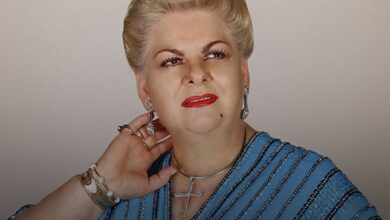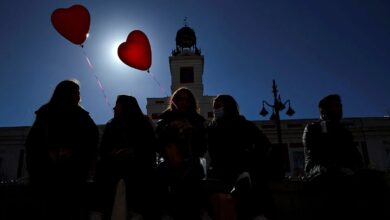Five female Latin American filmmakers you should know
From Chile to Colombia, these women have revolutionized Latin American cinema

Some women filmmakers, thanks to their commitment, talent and vision, managed to make the medium pay attention to the feminine perspective, taking the Latin American audiovisual through new ways. Find here 5 of them you should know:
Leer en español: Cinco cineastas latinoamericanas que debes conocer
Mariana Rondón, Venezuela
Rondón has traveled around the world with her productions. According to her website, the first one, the short film "Calle 22", won 22 prizes in the best short film category at festivals in New York, Italy and France. Her first feature, "At midnight and a half", premiered in 1999 at the Tokyo international festival, was awarded with several Opera Prima. "Postales de Leningrado" (2007) was the winner, among others, of the Mostra de Sao Paulo. Her next work, "The boy who lies", first projected at the 2011 Berlinale Generation, preceded her biggest success: "Bad Hair". The film, written and directed by her and which won Golden Shell for best screenplay in San Sebastian, tells the story of a small effeminate character involved in a family drama for his custody while facing his own prejudices about his physique.
Cecilia Barriga, Chile
This Chilean documentary maker has dedicated herself to recording influential social movements in history. Her peculiar look derives from her desire to travel and know what is happening politically on the planet. The feminine attracts her, but she does not close off; as she expressed it in an interview for the El Diario website: "I do not love the gender, but the interesting people", something evidenced by her documentary "Tres instantes, un grito", a graphic record of 15M, Occupy Wall Street and the taking of schools in 2011 in Chile. Interested in the processes of construction of identities that she calls "the dissidence of the traditional", she has focused her attention on "other resonances, other ways of understanding politics" reflecting from her images about power, revolution, demand of change, leadership and reconnection with the congregations of the past: starting points for the struggles of the present.
Susana Amaral, Brazil
Born in Brazil in 1932, she began her career in 1968. Her role as wife and mother of nine was no obstacle to filming her first short films and documentaries in 1970. As El País puts it, she has dedicated herself to transmuting stories of Brazilian writers , based on the internal coherence of the work and his own intuition: "What I think the book, I put it inside me and I come out with something that is a mixture of the author and myself". She has a very free way of working with the actors to whom she suggests creating the dialogues through the original story. Her method has given excellent results, as demonstrated by the actress Marcelia Cartaxo in 1985 with her Golden Bear nomination at the Berlin International Film Festival for her performance in "The hour of the star", which is based on Clarice Lispector's book. The feature film, which marked Amaral's debut as a director, was awarded to the International Film and Art Essay Confederation, the Grand Coral of the Havana Film Festival and the best director and best film at the Brasilia festival. Other productions by her are "Una vida en secreto" (2001) and "Hotel Atlántico" (2009).
Lucía Puenzo, Argentina
Daughter of director Luis Puenzo, the first Argentine to win an Oscar, this writer has published five novels that she has also adapted to the cinema. The first, "XXY", as El País relates, is based on the short story Cinismo by the writer Sergio Bizzio and tells the misadventures of a teenage hermaphrodite. The film was awarded at Cannes with the Grand Golden Rail and the Critics Week. According to the critic Eduardo "Quintín" Antin, her narrations are constructed from the carefully refined baroque style and have a vertiginous rhythm and characters of contradictory and varied impulses, something that is evident in "Niño pez", her second feature film. "Wakolda", another of her productions, based on her homonymous novel and presented at the San Sebastian Film Festival, received four awards, including best film and best direction, of the Unasur International Film Festival of San Juan.
Clare Weiskopf, Colombia
For Weiskopf, social issues are the priority, as the Filmin website puts it. The armed conflict, sexual violence and cultural phenomena such as the rebirth of the Colombian cumbia have earned him twice the Simón Bolivar award for journalism, the most prestigious journalism award in Colombia. She was the general director of "Chronicles of the End of the World", a documentary series that narrated the consequences of theories about the end of humanity in 2012. She debuted in theaters with "Amazona", a story that tells the story of her mother who after the death of her older daughter in Armero, Colombia, decides to leave her other children to move IGNORE INTO the Amazon. The film, as stated by the cultural magazine Arcadia, "is an x-ray of motherhood" that begins by analyzing the relationship between Clare and her mother, the latter's independence journey that for Clare was an abandonment, and ends with the birth of Noa, her daughter, with whom she was pregnant during the shooting process. The film won the public prize at the FICCI and the Andriy Mtrosov prize at Docudays UA, Ukraine.
Latin American Post | Isabel Pradilla S.
Translated from "Cinco cineastas latinoamericanas que debes conocer"





